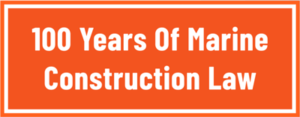Construction Law
 CWM represents owners, sureties, contractors, and suppliers in all aspects of construction contracting and dispute resolution, including marine construction on major maritime projects. Our Practice Group Chair is a former chair of the Construction & Public Contracts Law section of the Virginia Bar Association and was named “Lawyer of the Year – Construction” (Norfolk) by Best Lawyers in America® in 2022, 2023, and 2025, an honor granted to a single lawyer based on highest overall peer ratings in a practice area.
CWM represents owners, sureties, contractors, and suppliers in all aspects of construction contracting and dispute resolution, including marine construction on major maritime projects. Our Practice Group Chair is a former chair of the Construction & Public Contracts Law section of the Virginia Bar Association and was named “Lawyer of the Year – Construction” (Norfolk) by Best Lawyers in America® in 2022, 2023, and 2025, an honor granted to a single lawyer based on highest overall peer ratings in a practice area.
In all our efforts, our primary goal is to add value to our clients. We help clients consider critical aspects of their contracts, such as liquidated damages, change order clauses, differing site conditions, pay-when-paid clauses, indemnification clauses, and others, on both public and private projects.
We also assist when disputes arise. We handle negotiation, mediation, arbitration, and litigation in state and federal courts, as well as claim and dispute processes on public projects. Our attorneys are experienced with design defects, construction defects, delay claims, performance and payment bond claims, Miller Act cases, mechanic’s liens, change orders, indemnity claims, and a host of other matters.
Let us put our knowledge and experience to work for you. Call or email us today.
- Arbitration and Mediation
- Architect/Engineer Liability
- Change Orders
- Construction Defects
- Design Defects
- Equipment & Material Supplier Claims
- Equitable Adjustments
- Government Contracts
- Marine Construction
- Mechanics’ Liens
- Miller Act Claims
- Payment Bonds & Performance Bonds
- Quantum Meruit Claims
- Subrogation
- Surety Claims
Bonding Companies
Developers
Equipment and Material Suppliers
Financial Institutions
General Contractors and Subcontractors
Government Contractors
Marine Construction Companies
Owners
Sureties





